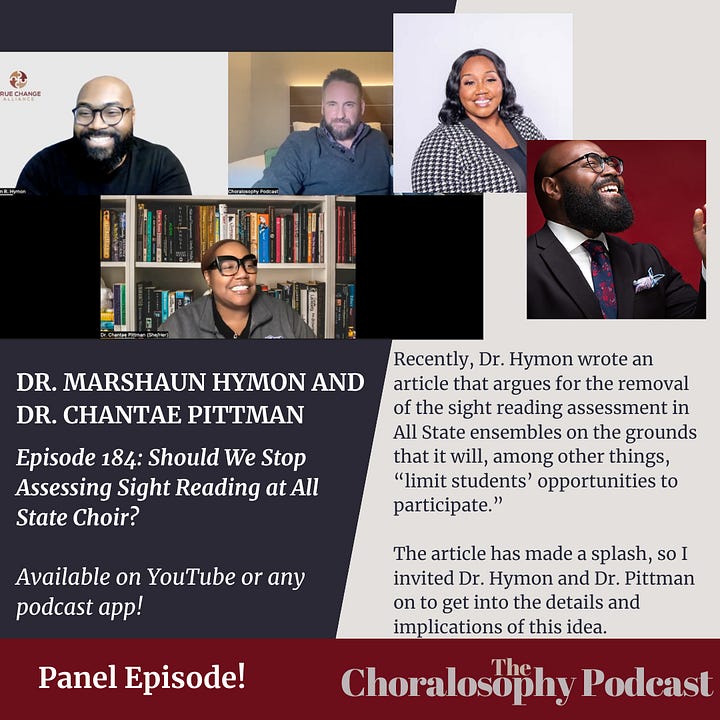"Merit" in Music Education- Does it still have a place?
Or are we afraid to talk about it? This article was originally published in the SWACDA magazine in September. It appears here in its more developed form.
We don’t have to choose between rigor and accessibility, and we don’t have to choose between evaluating something as “great” or “excellent” and valuing every rung of the music making skill ladder. Music reading is a great example of this.
In music education, we have long embraced the belief that success hinges solely on talent and hard work. According to this view, if a student is talented and diligent, they will inevitably achieve success—whether by joining an All-State ensemble, securing a college scholarship, or pursuing a distinguished performing career. This framework, which has produced many remarkable musicians from diverse backgrounds, seems to be the ultimate formula for success. However, this perspective has always overlooked a crucial element: luck. Factors such as geographic location, financial resources, race, gender, and access to quality instruction play a significant role in determining outcomes. While raising awareness of these disparities has gained traction in recent years, I believe we need to address an essential aspect that is often neglected.
We must acknowledge two key truths:
1) No perfect meritocratic system exists: It is a fallacy to believe that every choir audition, or job application, or college admissions form is perfectly selecting for the “objectively” best person for each position. So, of course, this would also extend out to societal level structures. Some may simplify this phenomenon by shrugging their shoulders and saying “life isn’t fair.” There is a time and a place for this shoulder shrugging. Sometimes we have to shrug to preserve our sanity. But, in my view there is NO appropriate time for that type of disengagement from inequities to lead us to create a mythology in our minds about “the perfect meritocratic system.”
2) Merit itself, and how to measure it, is not the problem. Many argue that because not everyone has equal access to rigorous music education, we should evaluate students based on different criteria. Indeed, we lack a universal standard for what constitutes a “great” musician, and differing opinions on this can be beneficial. In fact, I would argue that it is the fact that such a question would generate multiple answers, that makes this such an important topic for educators to discuss.

Recently, as an example, there have been significant movements to remove or deemphasize music reading assessments from All-State ensembles, college admissions processes, and even from evaluations of pre-service teachers. This demonstrates this “missing piece” of the analysis I described above. Of course, this argument often comes from a Post-Colonial perspective placing “Music Reading” as a “Western Classical” or even worse, “white" concept. I believe this is misguided for many reasons I won’t go into here, but can easily be found in podcasts on the topic. (Start with episode Literacy is Equity and Episode 184.) Setting the philosophical disagreement aside, we can look at this issue through the framework of “The Two Key Truths” about merit.
Is access to quality music reading instruction EQUAL for all students who may wish to be in an All State? No! Of course not. In Choral Music, is a proficient to skilled reader often regarded as “elite?” or “desirable?” in auditions? Yes. Of course. And for important and obvious reasons.
However, it does not necessarily follow that this means evaluating the skill is exclusionary. Merit matters, and teaching a well rounded WHOLE language approach to music is a crucial form of merit measurement for teachers and students. When students are not being taught key and critical skills, then exclusion IS occurring. But said exclusion is not the fault of the test that discovers it.


Is a balance between merit and equity possible?
To create a more inclusive music education system, we must reconcile merit with principles of equity. This means recognizing and addressing the barriers that hinder full participation. Initiatives such as providing high-quality music education to underprivileged communities, offering scholarships, and developing mentorship programs are essential for leveling the playing field. Such efforts ensure that merit truly reflects talent and effort, rather than external circumstances. But, this does not seem to be the popular approach publicly supported by some prominent colleagues professional organizations. (See NAfME’s disappointing definition of Music Literacy that does not include “reading” at all! This is, in my view, a professional embarrassment when contrasted to the broader field of Education. Compared below to definitions provided by Literacy advocacy groups. ) Instead, we seem to notice, and often times, gain clout by shouting loudly about the visible disparity at the highest levels of our field, and draw the conclusion that this is also the locus or focus of the solution.
I disagree.
This approach, which I refer to as “Trickle Down Social Justice,” attempts to level the playing field only where it is easily visible. This leaves the most vulnerable of our society out of sight and out of mind.
Music Literacy: knowledge and understanding required to participate authentically in the discipline of music by independently carrying out the artistic processes of creating, performing, and responding. -NCAS/NAfME Music Glossary
Literacy is the ability to read, write, speak and listen in a way that lets us communicate effectively and make sense of the world. -The Literacy Trust
Literacy is the ability to identify, understand, interpret, create, communicate, compute, and use printed and written materials associated with varying contexts. Literacy involves a continuum of learning in enabling individuals to achieve their goals, to develop their knowledge and potential, and to participate fully in their community and wider society. -UNESCO
Literacy is using printed and written information to function in society, to achieve one’s goals, and to develop one’s knowledge and potential. -NAAL (National Assessment of Adult Literacy)
Literacy is the ability to read, write, compute, and use technology at a level that enables an individual to reach his or her full potential as a parent, employee, and community member. -ProLiteracy
Probably the BIGGEST error I see in people who defend, or would likely NAfME’s definition is a fundamental swing and a miss. I hear that “focusing on music reading ignores the AURAL nature of music, and devalues musical traditions that have an aural foundation.” The miss is this: 1. ALL cultures and ALL languages come from an aural tradition. 2. Teaching fluent music reading to singers DEPENDS on aural fluency as well. (Audiation is developed the same way in singers as it is in early childhood for speakers. BY EAR.)
It is EASY to see the demographic make up of an All State Choir. It is EASY to see the demographics of who is asked to conduct an honor choir, or who gets into the prestigious school, or who sings in the pro choirs. It is nearly impossible to see into the classrooms of underserved students who, not only will not make the choir, but are tragically unlikely to even audition. THOSE are the students that deserve our focus.
For most choir directors, this occurs at the top of the hierarchy, but fails to address the root causes of inequity. The argument for lowering educational standards often comes from a well-intentioned place: that not everyone has had an equal opportunity to learn, so it is unfair to restrict opportunities based on factors beyond a student’s control. Instead, it is more effective to ensure that foundational quality remains a constant standard while working to address the underlying barriers that prevent students from accessing these opportunities.
Maintaining a consistent standard of quality—however defined—is crucial. This approach allows us to gauge the effectiveness of our profession. If we observe that students' skills have declined or that certain communities are underrepresented, we gain valuable insights into where our efforts should be focused. Simply lowering standards does not provide us with this critical feedback. In fact, it actively hides the most important information: whether or not what we are doing is working.
While the dream of a pure meritocracy in music education may be Utopian, the idea of merit itself is indispensable. It is through a balanced approach that recognizes both merit and the need for constant work at the “ground level,” that we can ensure the survival and flourishing of the music education pipeline. Let us continue to strive for excellence, while also working to dismantle the barriers that hinder true merit from being recognized and rewarded.
Past episodes on this and closely related topics: (These also can still be found in audio form on the podcast.)
.








Great article. The idea that we just simply live in a pure meritocratic world and you just need to be the best and the most qualified to have success is causing a lot of people to burn out when many now can’t even compete for even the most mediocre jobs in the field. And then there are far more examples of people who clearly got hired for reasons other than the purest merits.
How does the education system ethically set the best expectations while being honest about their selective applicability in the “real world”?
Dare I mention that when you talk about pay and merit, especially for those in the arts, it gets even dicier! Somehow adhering to the “starving artist“ ideology has become its own form of merit. I’ve seen more instances of people seemingly doubling down that kind of a mindset (or apathy?) compared to people expecting pay appropriate for their qualifications and experience. Inevitably, the level of quality will start to reflect the level of compensation.
I completely agree with the points made in this article. The discussion about balancing merit and equity in music education is incredibly important. Merit should absolutely be recognized, but as the author rightly points out, we cannot ignore the systemic barriers that affect access to opportunities. Talent and hard work should lead to success, but for many students, those factors are overshadowed by things like geography, financial resources, and lack of access to quality instruction, but success can still be accomplished.
The idea that a perfect meritocratic system exists is a fallacy. No system is truly free of external influences, and as much as we strive for fairness, we must recognize the invisible factors at play. Talent and effort are crucial, but they don't always guarantee success if students lack the same opportunities or access to quality education.
The argument for maintaining high standards while simultaneously addressing these inequities resonates with me. Lowering standards to level the playing field might seem like a solution, but it risks masking the real issues and failing to provide the necessary feedback about where improvements are truly needed. We need to focus on removing barriers and ensuring all students have the chance to develop the skills that will help them succeed.
This balanced approach is what will ultimately allow us to create a more inclusive, fair, and successful music education system. Thank you for sparking such an important conversation!